"As a child I only attended school for two years. Back then the thought was, "Why send a girl to school when she only is going to wind up in the kitchen?" When I was 25 years old the Catholic Nuns came to my village and taught me the value of being a woman. The priest told us that men and women are equal. He said the only ones who say women aren't equal to men are men. The priest built the Colegio Asuncion here in Huitan so that the indigenous people here (the Mams) would be educated. All of my 10 children attended that school and 9 of them went on to become teachers. Now, I go to school every afternoon. My daughter-in-law, who is the director of the elementary school here, teaches a class for older women like me who didn't have the opportunity to go to school when we were young." - Dona Juana Diaz Velasquez lives in El Plan, Huitan, Guatemala and has been a community leader for many decades.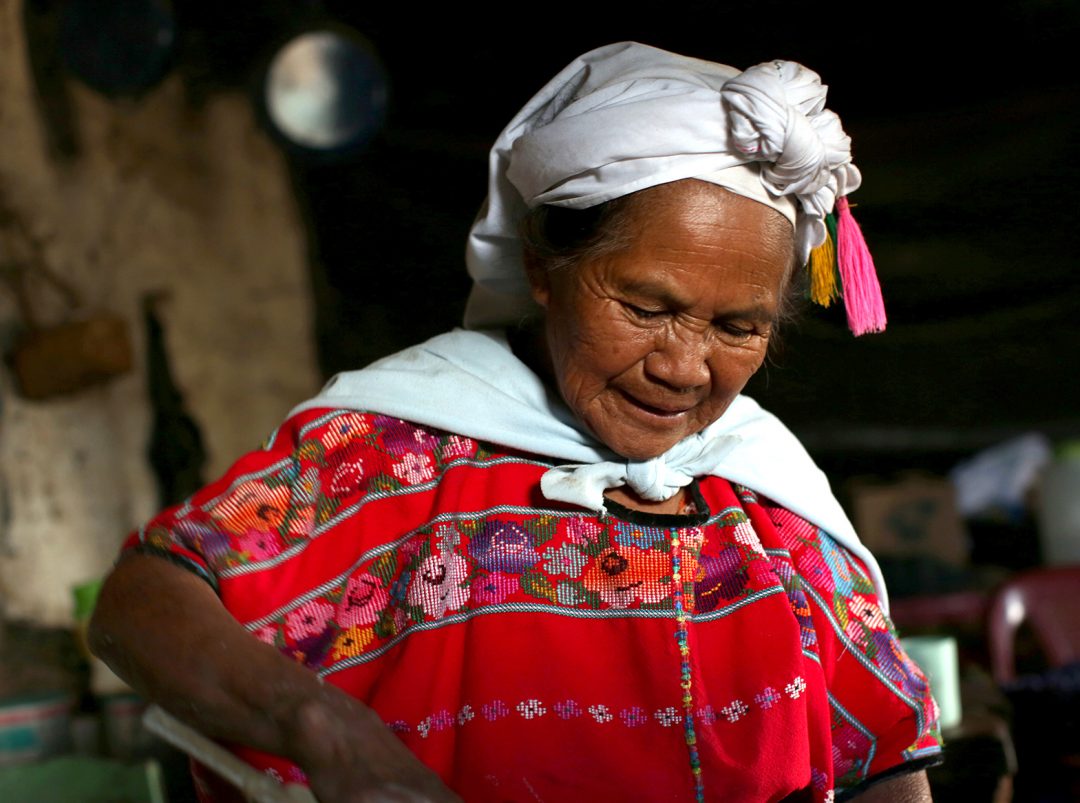
Krishanti Vignarajah
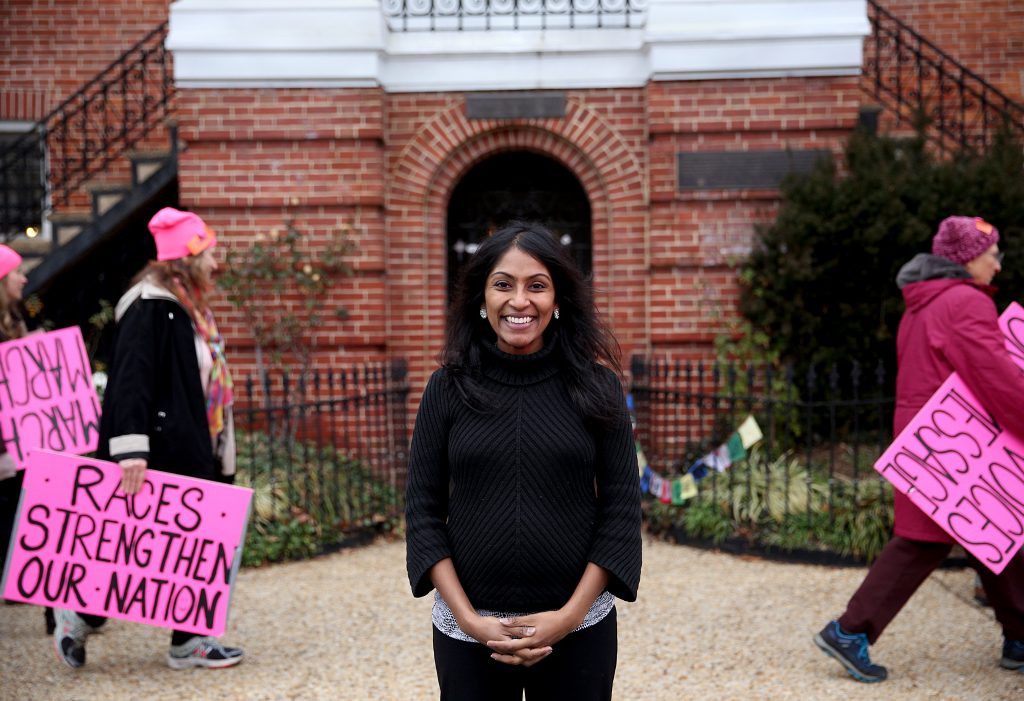 Krishanti Vignarajah - marched in D.C. this past week-end while pregnant and carrying her soon to be born daughter. Krishanti served as the Director of Policy for Michelle Obama and launched the Let Girl's Learn campaign.
Krishanti Vignarajah - marched in D.C. this past week-end while pregnant and carrying her soon to be born daughter. Krishanti served as the Director of Policy for Michelle Obama and launched the Let Girl's Learn campaign.
"I was born in Sri Lanka and my family and I were planning to move to Nigeria. My parents had already bought the plane tickets. And then, fortunately their green cards came through and we moved to the United States. If we had moved to Nigeria, I would have lived in the region of Boko Haram. Here, I could become anything I wanted. This made the Let Girls Learn campaign very personal for me. It helped me have the empathy and determination to be a champion of women's education."
Nana Fosu-Randall
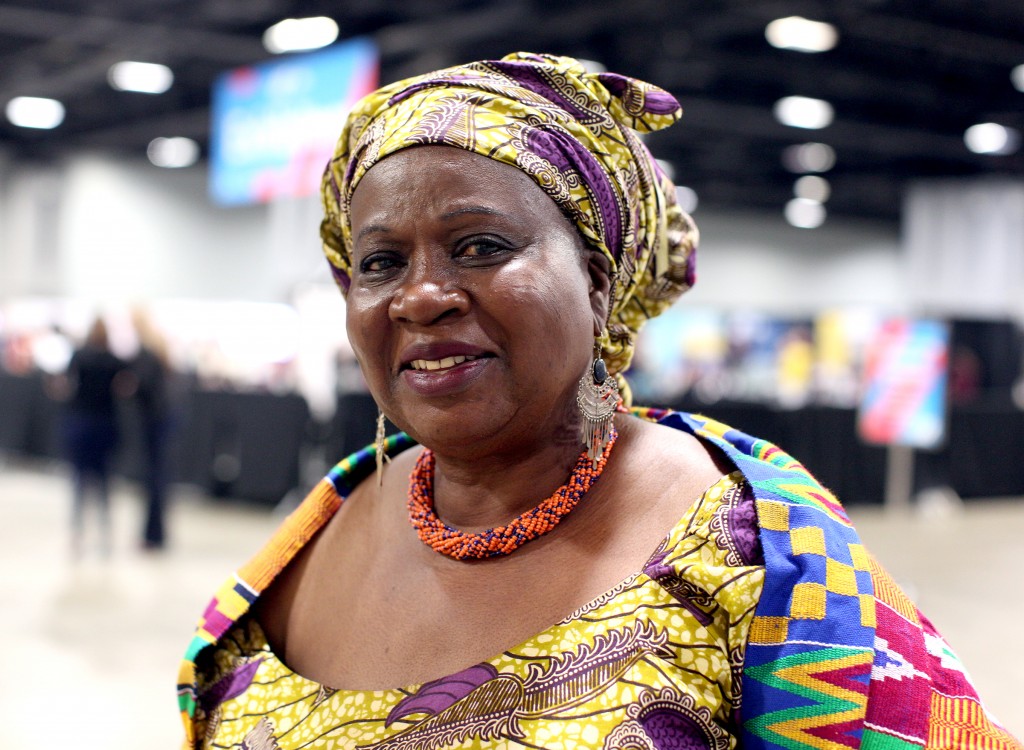 "I was in Liberia right after the war, working for the United Nations, and I saw this girl who had no hands. The girl was maybe 13 years old and she was sitting in a chair with a baby in her lap. I couldn't believe it - I had been working for the United Nations for many decades and had seen the aftermath of war in Lebanon, Kuwait, Iraq and Israel but this was different. Maybe because Liberia is very close to Ghana, where I am from, seeing that girl changed my world. I wondered how is she going to care for herself, how can she ever clean herself with no hands. When I returned to the United States I knew I had to address the turmoil in Africa and I started my organization, Voices of African Mothers in order to address poverty and hunger and to educate women." - Nana Fuso-Randall is the founder and President of Voices of African Mothers.
"I was in Liberia right after the war, working for the United Nations, and I saw this girl who had no hands. The girl was maybe 13 years old and she was sitting in a chair with a baby in her lap. I couldn't believe it - I had been working for the United Nations for many decades and had seen the aftermath of war in Lebanon, Kuwait, Iraq and Israel but this was different. Maybe because Liberia is very close to Ghana, where I am from, seeing that girl changed my world. I wondered how is she going to care for herself, how can she ever clean herself with no hands. When I returned to the United States I knew I had to address the turmoil in Africa and I started my organization, Voices of African Mothers in order to address poverty and hunger and to educate women." - Nana Fuso-Randall is the founder and President of Voices of African Mothers.
Lynn McMahon
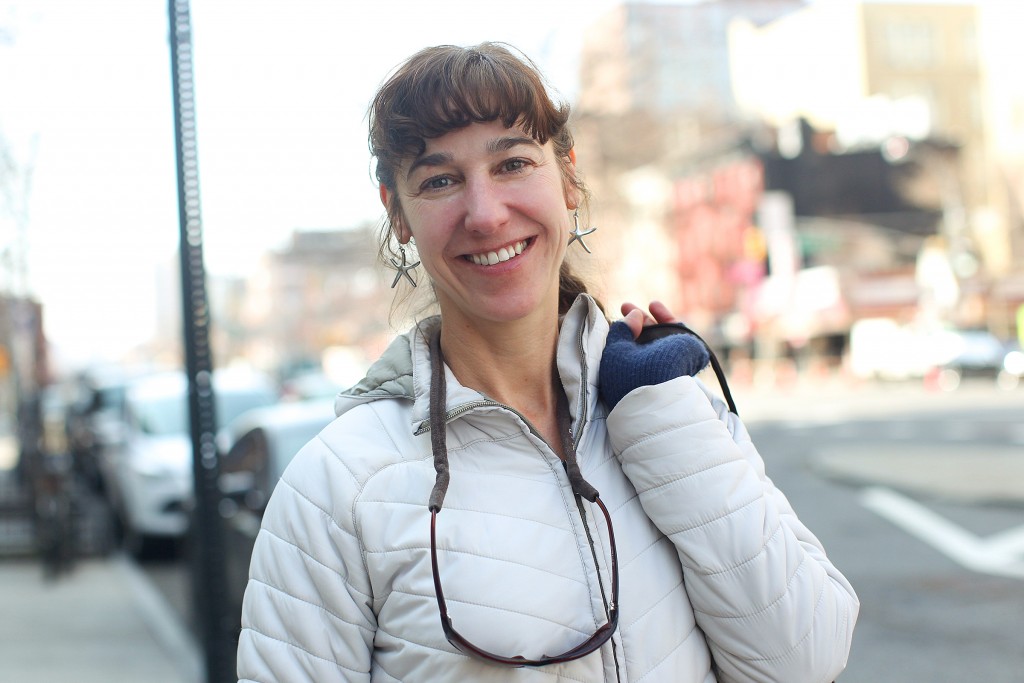 "I never felt hindered in any way being a woman. My father wanted me to be educated, he wanted me to be financially independent. It would have been nice if my father, who was a cabinet maker, had taught me how to make cabinets because I like making things with my hands. In fact he said he wrong not to encourage me to go into construction if that is what I wanted because obviously a woman could do that work too. But he didn't graduate from High School and he wanted me and my sister to go to college. I became a nurse."
"I never felt hindered in any way being a woman. My father wanted me to be educated, he wanted me to be financially independent. It would have been nice if my father, who was a cabinet maker, had taught me how to make cabinets because I like making things with my hands. In fact he said he wrong not to encourage me to go into construction if that is what I wanted because obviously a woman could do that work too. But he didn't graduate from High School and he wanted me and my sister to go to college. I became a nurse."
Emily Boggs
Ana Torres
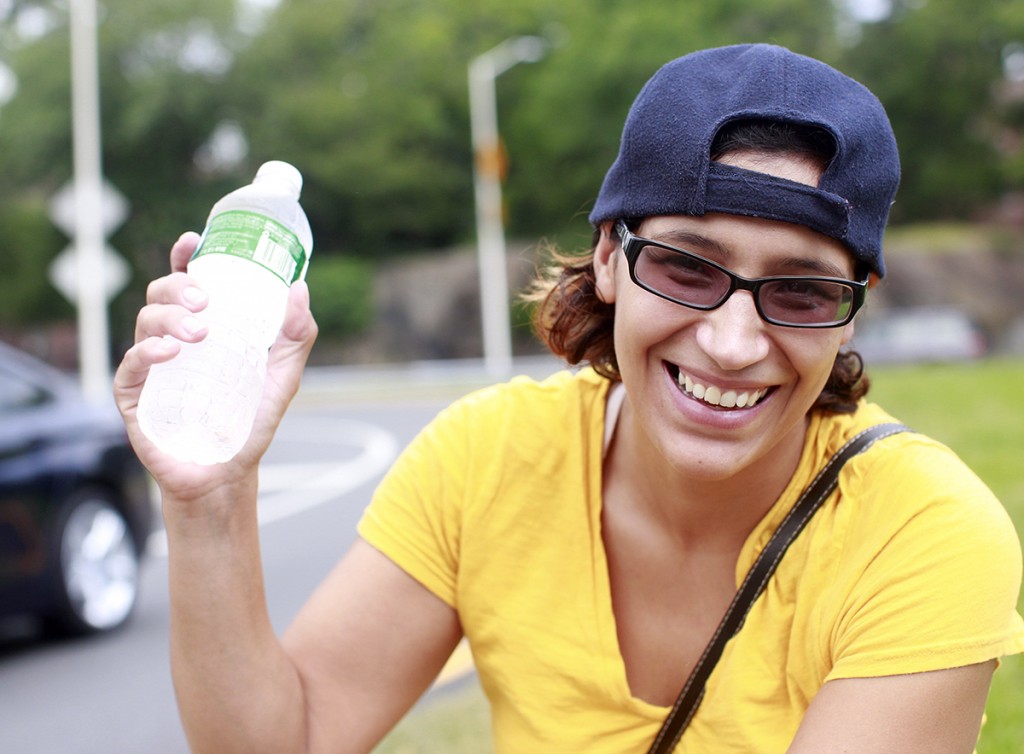 After finishing up a photo shoot in the Bronx River Park I was making my way to the subway when I saw a woman selling water at the intersection. Smart idea. It was hot and humid and I stopped to buy a bottle. And then like always, out came the story and out came my camera.
After finishing up a photo shoot in the Bronx River Park I was making my way to the subway when I saw a woman selling water at the intersection. Smart idea. It was hot and humid and I stopped to buy a bottle. And then like always, out came the story and out came my camera.
I had to ask if she was really making any money sitting there in the sweltering heat. Turns out, she can make between $200-600 depending on the day and I guess the temperature. "I only do this in the summer. I'm a teacher during the school year. " (sad side note here: I am fairly certain she is making more money per hour selling water than most teachers earn during the school year.) And being a single mother with four children she needs a summer job.
At 12 Ana was pregnant. Spoiler alert! There is a happy ending.
She needed an escape, her father was an alcoholic and her older brother's beat her and her safety net from the beatings was a boyfriend. His grandmother lived in an apartment downstairs and she spent a lot of time there." When my mother found out I was pregnant, she threatened my life" recalled Ana, "And she refused to let me have an abortion - and I would have." Her daughter is now 21. "I kept going to school even while I was pregnant. There was a daycare at my high school, but after a while I couldn't take it so I quit." Ana got a job at McDonald's and her GED through associates.
This is a list of jobs that she has had; McDonald's, Volunteer office at Jacobe, Patient relations at North Central Hospital, Jeans Plus, Intern at the career services at Monroe College, Hospitality at Monroe College, medical billing at an Optometrist's office. Six years after she had her first child she had another. But as Ana puts it "I pulled through." While working all those jobs and raising two children, Ana got a bachelor's degree in Business. And then, while working as a dialysis technician she completed her Masters in Education. She teaches 2nd grade at ICAR charter school and is a TA for ELA to help mediate reading. "I know," she said, "I beat the statistics."
Dominga Castro Lucas
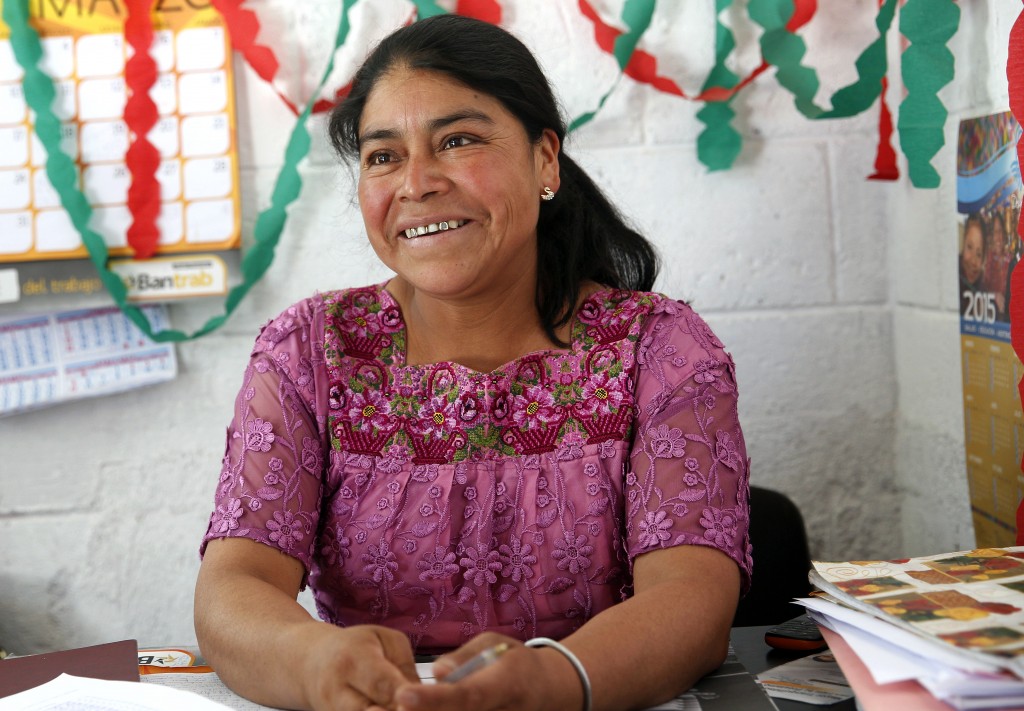 When Dominga was 18 she and her boyfriend were both studying to become teachers. Her boyfriend became a teacher while Dominga became pregnant. In the Highlands of Guatemala when a woman becomes pregnant her education is over, if it wasn't over already.
When Dominga was 18 she and her boyfriend were both studying to become teachers. Her boyfriend became a teacher while Dominga became pregnant. In the Highlands of Guatemala when a woman becomes pregnant her education is over, if it wasn't over already.
I met Dominga in 1993 she was nearly 20 years old and I was a 25 year old Peace Corps Volunteer. She was vibrant, smart, funny and beautiful. She taught me how to speak a few words in Mam and how to bathe in a Chuj (a sweat lodge used for weekly bathing). I taught her how to make apple pie. I urged her to go back to school, that is wasn't too late. And then two years later, my stint in the Peace Corps was over and we returned to the United States and Dominga was pregnant again.
Then in 1999, I sat in her one room house that had plastic for windows and talked about life while she nursed her third baby. Her husband was drinking and beating her and she needed help. She had never asked me for money before, but that day she asked for $100 so she could buy a propane stove. I thought, "How is a stove going to help?"
In March I returned to Guatemala. Dominga's mother-in-law told us she was at the elementary school. I found her in an office, her office. Dominga was now the Director of the elementary school.
With $100 Dominga bought a stove and cooked faster in the morning and then could heat up the food in the evening. This gave her the time to go to school in the afternoons. When she graduated the government assigned her to a school that took hours to walk to. Her second year she protested. She insisted that a mother of 4 children should be able to teach closer to home. She got a position teaching in the school closest to her home and after 8 years of teaching she became the director of a brand new school even closer to her house.
She said she went back to school because I encouraged her and that kept her going. I asked her, "Why did you listen to me?" She said, "Because you were the only one who believed in me. You were the only one who acknowledged that I could learn more, do more and reach my goals."
Dominga knew what she needed - a propane stove to free her from the long hours of cooking over a wood stove and an open fire. There is of course the saying, "Give a man a fish and he eats for one day. Teach a man to fish and he is set for life." I think there should be a different saying for women. "Listen to a woman and give her what she needs and then stand back and watch it happen."
